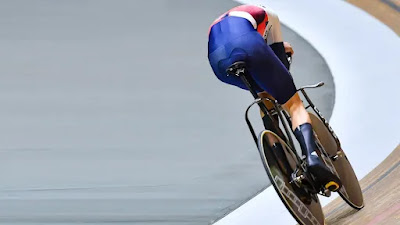This year's Winter Olympics have just ended. I have to admit that I didn't pay as much attention to them as I've paid to Olympiads past, though I haven't been living under a big enough rock to not know about the saga of Kamila Valieva. Whether or not she intentionally took a banned substance, the way her teammates and coach and the Russian sports establishment have treated her is child abuse, pure and simple. That the International Olympic Committee did nothing to prevent her situation from snowballing--and, if they do anything, they're more likely to discipline her than her team, coaches or the relevant Russian organizations--confirms something that I've long known: The IOC is, purely and simply, one of the most corrupt organizations in the world. Even if Valieva's tale of woe hadn't unfolded as it did, the fact that this year's games were awarded to Beijing is, for all sorts of reasons, evidence of how avaricious the IOC is.
(As Harry Shearer reminds us, the Olympics are a movement, and we need one--every day!)
As bad as the IOC is, it has at least one other rival for unscrupulousness in the sports world: the Union Cycliste Internationale (UCI). (I'd also put FIFA in the same league, if you will.) The travesty of Lance Armstrong's carrer is, alone, evidence of that. UCI officials seem to react to doping in one of two ways: They look the other way until they can't (that's how they acted in the L.A. farce) or they talk about how they're going to do whatever they keep riders from using banned substances and severely discipline those who did, while making some deal or another that sends the exact opposite message.
Red Bull, to my knowledge, isn't banned by any major sports organization. I've never drunk it myself, but from what I've heard, it gives one of the quickest, most intense, legal bursts of energy. That is probably the reason why it's so often associated, whether through sponsorship or in other ways, with high-intensity sporting events.
 |
| Evie Richards at the UCI Mountain Bike World Cup in Alberstadt, 2021 |
Such was the case with the Mountain Bike World Cup, the sport's premier UCI event. Sponsors are selected by the UCI, as they are at other events under the organization's umbrella. Red Bull is sponsoring this year's edition, as it's sponsored the past ten. I can't help but to see some UCI official winking while making the deal.
Well, this will be the last time for Red Bull. For next year's event, Discovery Sports will be the sponsor. They're part of the Discovery broadcast network, which broadcasts a wide variety of sporting events. I don't fault their work, but, given UCI's history, it's hard not to think that the money involved swayed them--and will give the UCI even less incentive than it (or the IOC or FIFA) to act on its stated commitment to fight doping and other forms of corruption in the sporting events they sanction.




